Episodes
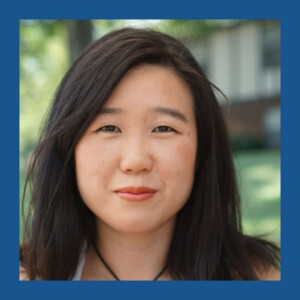
Thursday Oct 22, 2020
Thursday Oct 22, 2020
This week on the show, we’re going to talk about uncertainty, in particular employment uncertainty in academia and outside of it in the current pandemic context. Now in-between jobs, after her their postdoc, my guest will share her journey up to today and will talk about how confinement led her to take on new projects, teach herself new skills and double down on her investment in networking.
Download "Tools for Your PhD Journey" Now !
Vera Chan graduated her PhD in HK from 2014 and had 6 years of Postdoc experience working in the US and France.
This year Vera decided to transition into a non-academic role, and she is still undergoing the process of job-seeking as a foreigner living in France. I am happy that she is open to sharing with us about this vulnerable moment, the less glamorous side of life-after-PhD that not many people are willing to talk about. Vera is also the host of the PhD Coffee Time Youtube channel, where she shares her insights and advice covering all aspects of life as a graduate researcher.
Join the Papa PhD Postgraduate Career Exploration Group!
What you’ll learn about in this episode:
Dealing with cultural shock when moving countries for your PhD or your postdoc
Mistakes to avoid when thinking about your career, as a researcher
The importance of avoiding tunnel vision when considering career options
Organizing vortual coffee breaks as a way to socialize and network during confinement
The use of informational interviews for academic and non-academic jobs
How to work on your journey's narrative for the nonacademic space
How to leverage networking platforms like LinkedIn
This episode’s pearls of wisdom:
“I started with about 300 people on my network, who I know in person from my academic record, and after I'd redone my LinkedIn profile, I think it's a mindset shift, because in academia we don't need a LinkedIn profile to find a job, we use ResearchGate and we do other things, like Twitter, right? But I think LinkedIn is a statement saying that you are also ready and available if someone wants a freelance job or, you know, something. You can still be a PhD student, but you can also have a LinkedIn profile that advertises what you could do, like bioanalysis or statistics, you know. Those are the skills that you could offer – you don't have to have a full-time job. And I think that it's a profile that tells people that you are business ready.”
“I think any transitionning of career is very much like a broken relationship. I think people might have the negative thinking all the time about "this is the most terrible person, this is the worst experience in my life". I want to say that this is not it – I think that this is my experience that was from a useful time that I really enjoyed everything I've learned from my academic research. And I know that there ar are a lot of take-aways, like I can talk with people from different cultural backgrounds, I've learned that I can do technical writing – I'm not a native English speaker, but I'm quite good at attention to detail.”
Vera's links: LinkedIn – Linkedin.com/in/verabschan/; Youtube – YouTube.com/channel/UC2YqZKndK7HxCnbe06ZCEuw; Twitter – @VeraBSChan; Instagram – @PhDCoffeeTime.
Leave a review on Podchaser !
You might also like the following episodes:
Susanna L. Harris – Mental health advocate: PapaPhD.com/42; PapaPhD.com/43
Rebecca Maymon – PhD Recruitment: PapaPhD.com/75
Falisha Karpati – Skills Development: PapaPhD.com/30
Chris Humphrey – Career Counseling: PapaPhD.com/73
Launching your podcast?
If you're preparing to launch your podcast, you may be asking yourself what hosting platform to use.
I launched Papa PhD on Bluebrry because I wanted a professional service that would interface with my WordPress website, that would robustly broadcast Papa PhD to all platforms, and that would allow me to grow my podcast in years to come.
And these are the reasons why I'm recommending the Blubrry podcast hosting and syndication platf...
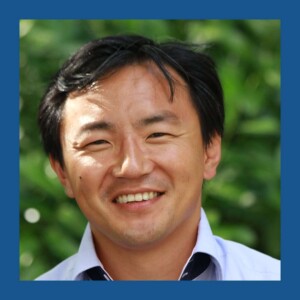
Thursday Oct 15, 2020
Thursday Oct 15, 2020
Est-ce qu'il n'y a qu'une route à suivre pour mener des recheches doctorales? En court – non. Chacun de nous est différent, a une histoire de vie différente, des valeurs différentes et des objectifs de vie qui nous sont très personnels. Cette semaine, mon invité qui oeuvre dans le transfert des connaissances mais aussi dans le conseil aux doctorants partage avec toi son trajet académique, les décisions et les moments tournants, et partage aussi la vision très actuelle qu'il a de la place des docteurs dans l'horizon professionnel d'aujourd'hui.
Télécharge la "Boîte à outils pour le doctorat" maintenant !
Marc Chevalier, PhD, est Chief Executive Officer et Chief Scientific Officer de NeckEpur et coordinateur du programme Master 2 Bioentrepreneurs. Docteur en neurosciences, il a poursuivi sa carrière en alternant postes scientifiques et entrepreneuriat, tout en étant fortement impliqué dans des projets associatifs visant à faciliter la mise en réseau et l'évolution professionnelle des doctorants/docteurs dans le secteur privé ou en dehors du milieu universitaire.
Ce que tu apprendras dans cet épisode :
L'importance du choix d'université et de laboratoire pour le succès de ton doctorat - le fit avec tes objectifs de vie, tes priorités et tes valeursPourquoi il est important de bien choisir son superviseur, son PI et pas seulement l'institution ou le sujet de rechercheLes avantages d'une thèse en trois ansLe stress et la santé mentale au doctorat en FranceLes avantages de choisir un projet qui a déjà de bons résultats préliminairesL'intérêt de prendre part aux activités associatives à l'universitéLes liens de Marc : Linkedin – Linkedin.com/in/marcchevalier; Twitter – @marcchevalier.
Laisse-moi un review sur Podchaser !
Tu aimeras aussi ces épisodes :
Boîte à outils pour les études doctorales – Mon cheminement : PapaPhD.com/37Amandine Bugnicourt – Recrutement de PhDs : PapaPhD.com/74Olivier Hernandez – Vulgarisation Scientifique : PapaPhD.com/56; PapaphD.com/45Virginie Levasseur – Développement international : PapaPhD.com/17
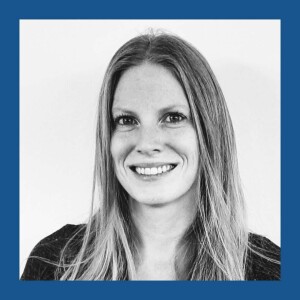
Thursday Oct 08, 2020
Thursday Oct 08, 2020
This week, I'm bringing you a conversation with someone who has recently made the transition from her PhD to the non-academic job market, and has done so into the PhD career development and recruitment domain.During our conversation, Rebecca Maymon, you will not only hear about her experience exploring career avenues during her PhD and navigating that transition, but you will also get her valuable insights based on her research and on her recruiting experience working in an organizations that focuses exclusively on PhDs.
Download "Tools for Your PhD Journey" Now !
Rebecca joined Adoc Talent Management in 2019 as a Research Officer and Recruitment Consultant, where she contributes to in-house research projects focused on the skills of PhDs and how they can foster innovation within and outside the academy. She also provides skills and career development workshops for PhDs, and acts as a recruitment consultant to help innovative companies find highly qualified talent that matches their needs.Rebecca holds a PhD in Educational Psychology from McGill University, Montreal. Over the past 10 years, she has developed and contributed to projects in graduate skills and employment, stress and social support during transition periods, motivation, engagement, and human behavior.
Join the Papa PhD Postgraduate Career Exploration Group!
What you’ll learn about in this episode:
How a peer support group can help you during graduate school and after in designing your career pathThe importance of identifying and taking advantage of resources offered by your university (and sharing them with your peers!)If your career center doesn't offer a service you need - ask for it and they might end up creating it!How to start broadening your network today - is is most likely where you'll find your next jobInformational interviews - they are your best friend, so don't be afraid of reaching out to peopleThe importance of building bridges between university research centers and employersThis episode’s pearls of wisdom:“Coming back to the informational interviews, just expanding yourself outside of your network, just talking to people who are not in your department, in your discipline, it gives you those opportunities to kind of nail that down, so that when you get to an interview, you've messed it up a few times and you're good, now.”“As far as workshops, pretty much I saw that I was able to go to, I went to. There were things about kind of the way they do IDPs or individual development plans, now, just helping you reflect and map out your motivations and aspirations and values, and things like that.”“Most PhDs are finding their jobs through their network.”Rebecca's links: LinkedIn – Linkedin.com/in/rebecca-maymon-phd-a70523153; Website – Adoc-TM.com; PhDetectives report: http://bit.ly/2NHqeGA .
Leave a review on Podchaser !
You might also like the following episodes:
Zoë Ayres – Water chemistry: PapaPhD.com/54; PapaPhD.com/55Nathalie Ross: PapaPhD.com/50; PapaPhD.com/51Falisha Karpati – Skills Development: PapaPhD.com/30Chris Humphrey – Career Counseling: PapaPhD.com/73
Launching your podcast?
If you're preparing to launch your podcast, you may be asking yourself what hosting platform to use.
I launched Papa PhD on Bluebrry because I wanted a professional service that would interface with my WordPress website, that would robustly broadcast Papa PhD to all platforms, and that would allow me to grow my podcast in years to come.
And these are the reasons why I'm recommending the Blubrry podcast hosting and syndication platform.
Click on the button below or use the promo code PapaPhDBlue on the Blubrry website to unlock a one month free trial:
Try one free month with Blubrry !
If you are starting a serious podcast project, do consider one of the first podcasting hosts out there, offering state of the art services,
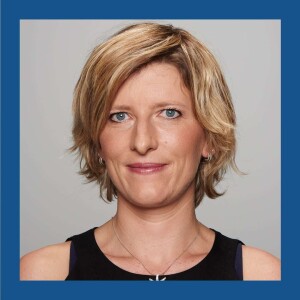
Thursday Oct 01, 2020
Thursday Oct 01, 2020
De retour en français pour cette saison 2 de Papa PhD et cette semaine je vous apporte une invitée qui travaille depuis 2008 à faire le pont entre docteurs et employeurs. Tu remarqueras que le format a un peu changé : les entrevues dureront environ 40 minutes et seront toujours publiées le jeudi, tu m’entendras intervenir plus et commenter des moments-clés de la conversation et – petit cadeau – j’inclurai toujours à la fin de l’épisode des vignettes audio de podcasts amis, en français, et qui t’intéresseront sûrement.
Téléchargez la "Boîte à outils pour le doctorat" maintenant !
Amandine Bugnicourt est ingénieur de l'INSA Lyon en biochimie et biotechnologie et est titulaire d'un doctorat en microbiologie, biologie moléculaire et cellulaire de l'Université Paris 7 - Denis Diderot. Elle a travaillé dans la recherche en France, en Europe, aux États-Unis. Convaincue de la valeur ajoutée que les doctorats peuvent apporter à des entreprises dans des postes de haut niveau, mais aussi consciente des difficultés que rencontrent certains d'entre eux pour rechercher et évaluer ces profils, elle a cofondé Adoc Talent Management au début de l'année 2008. Directrice associée de l'entreprise, elle est en charge de la stratégie de développement et gère les trois activités où elle travaille également Recrutement, Formation, Innovation & Études.
Joignez-vous au groupe d'exploration de carrières Papa PhD !
Ce que vous apprendrez dans cet épisode :
L'importance de rechercher soi-même son champ des possibles dans ce qui a trait aux possibilités de carrière, quitte è créer son poste quand vos compétences correspondent à un besoin nouveau et particulierLe rôle central du réseautage dans ta préparation et dans la définition de ton champ des possiblesLa R&D et les sociétés exportatrices comme chefs de file de l'emploi de docteursLe numérique et les domaines émergents et comment y accéderL'importance d'anticiper ta poursuite de carrière le plus tôt possiblePourquoi il faut chercher un emploi qui va nous plaire, où on va pouvoir s'épanouirLa valeur de l'hulimité dans toutes ces démarchesLes perles de sagesse d'Amandine :« Il faut que le docteur – y compris issu des lettres ou des humanités – anticipe sa poursuite de carrière le plus tôt possible et pour moi ça passe par le fait de ne surtout pas se dire "comment je vais me trouver un job ?" Parcequ'un job il en trouvera un, mais vraiment de se dire "comment je vais trouver de l'emploi où je viais m'épanouir demain et où je vais apporter le plus de plus'value. »« Cest une manière différente de réfléchir à son profil. Ça nécessite vraiment d'avoir une approche réflexive, de faire une introspection sur ses savoirs, ses savoirs-faire, ses savoirs-être, de décortiquer son travail doctoral sous l'angle des compétences qu'on a à apporter et de pouvoir les expliquer, demain à un non-expert, puisque les recruteurs, en général, ne sont pas experts du doctorat, ni du domaine disciplinaire. »Les liens d'Amandine : Linkedin – https://www.linkedin.com/in/amandinebugnicourt; Twitter – @AdocTM; Web – Adoc-TM.com; Étude PhDétectives – Adoc-TM.ca/etudes.
Laissez une évaluation sur Podchaser !
Vous aimerez aussi ces épisodes :
Boîte à outils pour les études doctorales – Mon cheminement : PapaPhD.com/37Carine Monat – Journalisme scientifique : PapaPhD.com/40Olivier Hernandez – Vulgarisation Scientifique : PapaPhD.com/56; PapaphD.com/45Virginie Levasseur – Développement international : PapaPhD.com/17
Envie de lancer un podcast?
Mon ami et collègue podcasteur Marco Bernard et son Académie du Podcast ont ce qu'il vous faut si vous avez une idée, mais qu'il vous manque les connaissances pour mettre en place votre podcast.Dans la formation Podcasting 101, Marco a préparé plus de 20 vidéos et des tutoriels où il explique quel équipement se procurer, comment faire le montage et comment le mettre en ondes sur les p...
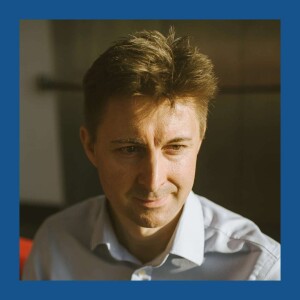
Thursday Sep 24, 2020
Thursday Sep 24, 2020
Download "Tools for Your PhD Journey" Now !
Welcome to Season 2 of Papa PhD!To kick-start this second season of interviews, I’m bringing you someone who has been helping researchers figuring out their careers for a while, now, and who will be recounting how he navigated his transition and how he got to the position he’s in today.But before we go into the interview, I want to quickly share with you what new features you’ll be noticing starting today, on Papa PhD. The first big change is that the interviews are now going to be shorter, around 40 minutes, and they’ll be published as a single episode, on Thursday. Second – you’ll see that I’ll be spending more time discussing what my guests do today and what advice they have for you. And you’ll see the more we go into the interview, the more value you’ll find. And finally, every episode I will have a short section at the end where I’ll be sharing trailers of podcasts I think you’ll enjoy, and that are friends of the show.I hope you enjoy the new format!
So today, on Papa PhD, I have with me Dr Chris Humphrey.Chris Humphrey is a project manager and careers consultant, and the founder of the popular careers website Jobs on Toast. Chris holds a BA in English Studies and an MA in Culture and Social Change, both from the University of Southampton. He completed his PhD in Medieval Studies at the University of York in 1997, and held a post-doctoral fellowship there until 2000.Since leaving academia, Chris has worked as a project and programme manager in the private sector, specialising in technology, transport, financial services and sustainability. Today he works as a team leader and project manager for a leading European sustainable bank. Chris is a Member of the Association for Project Management and a registered PRINCE2 Practitioner.Chris is passionate about helping people with their careers and personal development. He has given numerous careers talks at universities in the UK, Ireland, Australia and the US, and has taken part in live Q&A events on The Guardian’s website, and for jobs.ac.uk. Chris has contributed a video training course to the popular careers website CareerCake, explaining the benefits of further study for personal and career progression (covering Diplomas, Master’s courses and PhDs).In 2012 Chris founded the website Jobs on Toast as a way to help Masters students and doctoral graduates access the abundant career opportunities available outside of higher education.
Join the Papa PhD Postgraduate Career Exploration Group!
What you’ll learn about in this episode:
The importance of being open to new experiences when considering career optionsWhy it's ok to take on a lower entry-level job when transitioning and why you will then quickly ascend afterHow a PhD translates in the project management spaceHow career advancement works in the private sectorThe importance of thinking out of the box and not putting all your energies into the "logical" choices, when looking at job postings or when offered opportunities that fall outside of your universe of possiblesThis episode’s pearls of wisdom:“Typically in the UK only 50% of PhDs are still in academia three-and-a-half years after they graduate, you know. Some people are obviously doing research work still, as postdocs, some people are doing teaching and lecturing and some are in administrative positions, but yeah - half of all PhDs will be working outside of academia. When you tell that to specially first- and second-year PhDs, they can't believe it.It's mind-blowing, you know? And even when I talk to people I meet, and I introduce myself, say I've got a PhD or something, and they say "Why aren't you working at Oxford or Cambridge? You've got a PhD... That must be what you should have been doing..." And it's interesting that there's this powerful expectation. But it's trying to educate people really about developing a career consciousness.
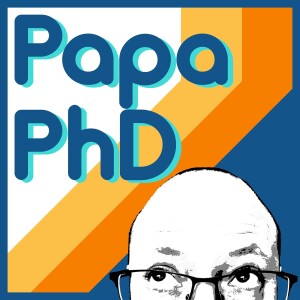
Thursday Sep 17, 2020
Thursday Sep 17, 2020
Téléchargez la "Boîte à outils pour le doctorat" maintenant !
Transcription de l'épisode :
Salut! C’est moi, David !
Si tu viens de découvrir Papa PhD, bienvenue ! La saison 2 du podcast est presque arrivée - l'épisode 1 sera diffusé le jeudi 24 septembre - et je suis vraiment heureux de vous reprendre contact avec vous tous!
Voici ce qui est au menu pour la saison 2.
Dans la saison 1, j'ai fait de mon mieux pour vous présenter des histoires de personnes titulaires d'une maîtrise ou d'un doctorat, travaillant dans le milieu universitaire ou non, avec des parcours professionnels aussi divers que possible.
Il y a eu de histoires inspirantes sur l'entrepreneuriat, sur les carrières créatives, sur la santé mentale au doctorat, sur le travail interdisciplinaire et de vulgarisation, ainsi que sur l'accès aux carrières dans des domaines spécifiques. Vous pouvez avoir un aperçu de toutes ces conversations en écoutant les épisodes 68 et 26, que vous trouverez au PapaPhD.com/68 et PapaPhD/26.
Au cours de la saison 2, je vais non seulement vous présenter des invités ayant des parcours professionnels différents, mais je vais aussi interviewer des spécialistes du domaine de l'orientation professionnelle et du recrutement, pour discuter avec eux de l'évolution du doctorat et partager avec toi leur point de vue sur la meilleure façon de naviguer sur les eaux souvent brumeuses de la transition vers la vie professionnelle.
Nous parlerons de l'incertitude de l'emploi pendant la pandémie de COVID, de l'évolution et de l'avenir de la marque PhD dans la société et sur le marché du travail, du développement des compétences et de la construction de la carrière, ainsi que de la santé mentale, en essayant de centrer chaque épisode sur une question principale.
Donc, si tu viens de découvrir Papa PhD et que tu veux te préparer pour la saison 2, visite PapaPhD.com et écoute les conversations de la saison 1. Et si tu veux être sûr de ne manquer aucun des nouveaux épisodes, rends-toi sur PapaPhD.com/Saison2 et inscris-toi pour les recevoir directement dans ta boîte courriel !
Reçois Papa PhD directement par courriel !
Et c'est tout ce que je voulais partager avec toi dans cet épisode zéro de la nouvelle saison! Au plaisir de t’avoir dans mon auditoire et d'avoir de tes nouvelles !
Merci d'être un fan et prends soin de toi !
Tu aimeras aussi ces épisodes :
Boîte à outils pour les études doctorales – Mon cheminement: PapaPhD.com/37
Papa PhD Pearls of Wisdom – 2019 Season: PapaPhD.com/26
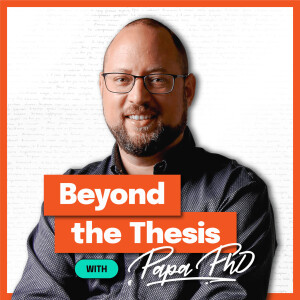
Wednesday Sep 16, 2020
Wednesday Sep 16, 2020
Download "Tools for Your PhD Journey" Now !
Episode transcript:
Hi! David here!
If you’re new to Papa PhD, welcome! Season 2 of the podcast is almost here - Episode 1 is airing on Thursday, the 24th of September - and I’m really happy to be back in touch with you!
So here’s what’s in the works for Season 2.
On season 1 I tried my best to bring you stories from people with master’s or PhD degrees working in and out of academia, with career paths as diverse as possible.
There were great stories about entrepreneurship, about following creative careers, about mental health in graduate school, about interdisciplinary and outreach work in academia, and about accessing careers in specific domains. You can get a glimpse of all those conversations on episodes 68 and 26, by going to PapaPhD.com/68 and PapaPhD.com/26.
In season 2 I’m going to switch it up and not only bring you guests from different backgrounds and career journeys, but I will also be interviewing specialists who work in the career counseling or in the recruitment domain, to discuss the evolution of the PhD and to share their take on how to best navigate the often foggy waters of transitioning to your professional life.
We’ll be talking employment uncertainty during the COVID pandemic, evolution and future of the PhD brand in society and in the job market, skills development and career building, and mental health, trying to focus each episode on one main question.
So if you’re new to the show and want to warm up to Season 2, go to PapaPhD.com and listen to the Season 1 conversations. And if you want to make sure you don’t miss any of the new episodes, go to PapaPhD.com/season2 and sign up to receive them straight in our inbox!
Get Papa PhD in your inbox!
And that’s all I wanted to share with you in this Season 2 episode Zero. Looking forward to having you in the audience and to hearing from you!
Thank you for being a fan and stay safe!
You might also like the following episodes:
Tools for your PhD Journey – My Path: PapaPhD.com/36
Papa PhD Pearls of Wisdom – 2019 Season: PapaPhD.com/26
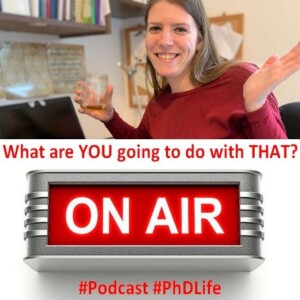
Thursday Aug 27, 2020
Thursday Aug 27, 2020
Download "Tools for Your PhD Journey" Now !
Welcome to this Papa PhD season finale, a special collab with the What Are You Going to Do With That podcast. Right now, if you go to their website you will find the interview I gave for their show! In this second part, Danni Reches talks about her life outside her research. During this conversation we had a great exchange about working versus volunteering and about the importance of non-research activities in terms of networking.
Danni Reches is a PhD fellow and research associate at the Haifa Center for German and European Studies at the University of Haifa. She received her BA in Middle Eastern Studies from Leiden University in the Netherlands, during which she co-established a student society. As part of her BA, she spent a semester at the Hebrew University of Jerusalem on an exchange program. Danni also holds a BA certificate in Peace & Conflict Studies and an MA degree in Diplomacy, a specialization in International Relations, from the University of Haifa.Her PhD dissertation focuses on policy and perceptions of immigrants from the Middle East in Europe. In other research projects, Danni works on refugees and international law in the EU during crises, including the so-called ‘refugee crisis’ and the corona pandemic.
Join the Papa PhD Postgraduate Career Exploration Group!
What you’ll learn about in this episode:
Having activities and projects outside your research is positive, but be careful not to overextend yourselfHow conferences can add to your networking and to your research, besides the fun aspectWorking around your institution or department to supplement your stipend has hidden advantagesVolunteering vs being exploited as a graduate studentWhat organizing seminars can bring you as a graduate researcherThis episode’s pearls of wisdom:“ I, in a way, learned that academia is about rejection. You will have to face rejection. But the positive thing about it, and what I've learned about it is that that's ok. You just nead to find a way for yourself to deal with that, to not take all of that personnally. You not getting a scholarship, you not getting into a conference, or your article being dismissed, doesn't mean that you are a failure. It doesn't mean anything about you as a person.”“ If there would be a university that would say 'Ok – you are our PhD student and you're getting a scholarship for doing the PhD, so now, we're half way through the semester and we want to do a conference but we have no one to do it, so we want you to organize the conference for us – go and ot it – then I would be like "no, this was not part of the contract". This is very easy to ask of someone in this position because they might be afraid to tell you 'No'. It's a lot of extra work that also takes away time to do sports and to do you research. And then I would say "No, this is not ok to ask, this is not a kind of volunteering that I could support".”Danni's links: LinkedIn – LinkedIn.com/in/danni-reches-6b6b7671; What To Do With That Podcast – shows.acast.com/whatareyougoingtodowiththat; Twitter – https://twitter.com/What2doWithTHAT; Instagram – Instagram.com/what2dowiththat.
Leave a review on Podchaser !
Support the show on Patreon !
Launching your podcast?
If you're preparing to launch your podcast, you may be asking yourself what hosting platform to use.
I launched Papa PhD on Bluebrry because I wanted a professional service that would interface with my WordPress website, that would robustly broadcast Papa PhD to all platforms, and that would allow me to grow my podcast in years to come.
And these are the reasons why I'm recommending the Blubrry podcast hosting and syndication platform.
Click on the button below or use the promo code PapaPhDBlue on the Blubrry website to unlock a one month free trial:
Try one free month with Blubrry !
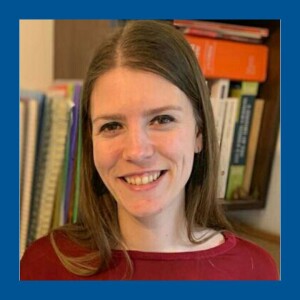
Wednesday Aug 19, 2020
Wednesday Aug 19, 2020
Download "Tools for Your PhD Journey" Now !
Welcome to this Papa PhD season finale, a special collab with the What Are You Going to Do With That podcast. Right now, if you go to their website you will find the interview I gave for their show! On the Papa PhD mic with me for this interview, I have Danni Reches, host of the W2DWT podcast, talking about her journey up to her PhD and about how she includes other projects and activities in her life as a graduate researcher, namely, working for the Minerva Center for the Study of Law under Extreme Conditions, at the University of Haifa.
Danni Reches is a PhD fellow and research associate at the Haifa Center for German and European Studies at the University of Haifa. She received her BA in Middle Eastern Studies from Leiden University in the Netherlands, during which she co-established a student society. As part of her BA, she spent a semester at the Hebrew University of Jerusalem on an exchange program. Danni also holds a BA certificate in Peace & Conflict Studies and an MA degree in Diplomacy, a specialization in International Relations, from the University of Haifa.Her PhD dissertation focuses on policy and perceptions of immigrants from the Middle East in Europe. In other research projects, Danni works on refugees and international law in the EU during crises, including the so-called ‘refugee crisis’ and the corona pandemic.
Join the Papa PhD Postgraduate Career Exploration Group!
What you’ll learn about in this episode:
Why taking a break between your master's and your PhD can be good for you and allow for some soul-searching, volunteering in your community, and meeting new, like-minded peopleWhat advanteges you can reap from choosing a smaller PhD programHow a PhD in social sciences worksWhy you should connect with peers in a wider circle, in graduate schoolThis episode’s pearl of wisdom:“Traveling and going to the other side of the world might sound very spontaneous and exciting, but I think it,s also allowing yourself to take that time, even if it's just a few weeks. To know that when you start something, you've considered it and it's not something you just jumped into because other people told you it's what you were supposed to do – it was really your own choice. And I think it's muche easier to live with that than any other way.”“I think it's good for PhD students who are just about to start to realize that they can go out and look for peers. They don't have to sit and wait until it comes to them. Because this can feel like a very lonely process and it doesn't necessarily have to be.”Danni's links: LinkedIn – LinkedIn.com/in/danni-reches-6b6b7671; What To Do With That Podcast – shows.acast.com/whatareyougoingtodowiththat; Twitter – https://twitter.com/What2doWithTHAT; Instagram – Instagram.com/what2dowiththat.
Leave a review on Podchaser !
Support the show on Patreon !
Launching your podcast?
If you're preparing to launch your podcast, you may be asking yourself what hosting platform to use.
I launched Papa PhD on Bluebrry because I wanted a professional service that would interface with my WordPress website, that would robustly broadcast Papa PhD to all platforms, and that would allow me to grow my podcast in years to come.
And these are the reasons why I'm recommending the Blubrry podcast hosting and syndication platform.
Click on the button below or use the promo code PapaPhDBlue on the Blubrry website to unlock a one month free trial:
Try one free month with Blubrry !
If you are starting a serious podcast project, do consider one of the first podcasting hosts out there, offering state of the art services, including IAB certified statistics, based on years of experience in the podcasting space.
Happy podcasting!
You might also like the following episodes:
Dana Murchison – Science Outreach: PapaPhD.
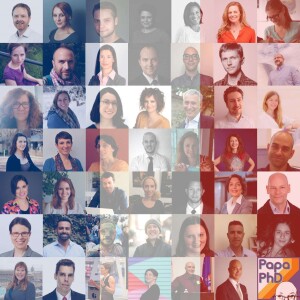
Friday Jul 31, 2020
Friday Jul 31, 2020
Téléchargez la "Boîte à outils pour le doctorat" maintenant !
Transcription de l'épisode :
Bonjour à tous !
Nous arrivons à la fin de la première saison de Papa PhD et aujourd'hui, je voulais juste remercier tous les auditeurs qui ont suivi l'émission partout autour de la planète. Ça a été très impressionnant de voir l'émission grandir comme elle l'a fait au cours de cette première année, donc encore une fois, l'une des choses que je voulais faire aujourd'hui, c’est de vous remercier, vous qui êtes là semaine après semaine, et qui pensez à votre doctorat, à votre maîtrise et réfléchissez à ce à quoi votre carrière pourra ressembler à l'avenir. J'espère vraiment que les conversations que j'ai partagées dans sur le podcast vous ont inspiré dans votre parcours.
Au cours de cette première saison, j'ai eu la chance de parler avec tant d'invités intéressants et d'apprendre avec eux, et j'espère avoir pu partager suffisamment de leur sagesse avec vous pour vous aider dans votre planification de vie et dans votre exploration de carrière.
Je suis extrêmement reconnaissant d'avoir eu des invités couvrant tant de domaines académiques différents : des sciences de la vie à l'ingénierie, en passant par la psychologie et la littérature. La portée de ces conversations a de loin dépassé ce que j'avais imaginé quand j’ai décidé de lancer le podcast. Je tiens donc à remercier de tout mon cœur tous les invités qui ont participé à la première saison de Papa PhD.
En repensant à toutes ces conversations et en pensant à vous, qui réfléchissez à votre avenir, à la voie à suivre, aux décisions à prendre, j'ai le sentiment que l'un des fils conducteurs de toutes ces conversations, et c'est peut-être le plus important, a été de vous dire que vous avez le droit d’avoir des expériences diversifiées pendant votre diplôme de 2e ou de 3e cycle. Non seulement dans le cadre de vos recherches, mais aussi, et c'est important, en dehors de celles-ci. Que ce soit en intégrant des associations d'étudiants, en faisant du bénévolat dans des projets de vulgarisation, en intégrant des communautés sportives ou créatives, mais aussi en faisant des stages dans l'industrie ou des pauses où vous essayez quelque chose de complètement différent avant d'entamer un nouveau chapitre de votre vie universitaire.
Un autre point commun qui me semble très important concerne la façon dont vous vous percevez en tant qu'universitaire, en tant que chercheur, en tant que candidat à un emploi. À l’issue de vos études, vous n'êtes peut-être pas conscient de certaines compétences importantes que vous avez développées, mais qui ne sont pas techniques, qui n'ont pas de rapport direct avec votre sujet de recherche. L'une des compétences très importantes que vous développez en rédigeant une thèse de maîtrise ou de doctorat est votre capacité à analyser, à digérer et à donner un sens à des ensembles de données complexes et de grande taille. Celle-ci va de pair avec votre capacité à résoudre des problèmes. Ce sont des compétences qui sont très appréciées par les employeurs.
La gestion de projet est un autre domaine dans lequel vous avez naturellement développé des compétences pendant vos études. De nombreux postes sur le marché du travail exigent la capacité d'entreprendre de grands projets, des projets complexes, et d'être capable de planifier, de fixer des jalons, de définir des objectifs, puis de travailler à la réalisation de ces objectifs. Un autre des aspects qui ont été mentionnés à maintes reprises par les invités que j’ai eu à mon micro.
Si vous réécoutez les différents épisodes, les différentes entrevues, vous trouverez davantage de ces compétences, en rapport avec le domaine spécifique dans lequel chaque invité travaille actuellement. Donc, explorez les entrevues de la Saison 1, écoutez ce qu’avaient à partager les invités qui travaillent dans un domaine qui vous intéresse. Vous verrez, vous trouverez des conseils que vous pourrez utiliser pour commencer à bâtir votre propre p...
